Eighteen months of hard work paid off for four Royal Navy officers as HMS Oardacious completed the Talisker Whisky Atlantic Challenge, rowing 2,550 nautical miles from the Canary Islands to Antigua in 37 days, 6 hours and 40 minutes.
We spoke to the team’s captain Hugo Mitchell-Heggs to find out how the team prepared mentally and physically for the daunting challenge of rowing non-stop across the Atlantic Ocean…
Hi Hugo, you must have seen some pretty tough conditions during your 10 years in the Royal Navy but were there any moments during the Atlantic Rowing Challenge where you thought ‘what on Earth are we doing out here’?
Well, 18 months of hard work before we even pushed off from the start line were all brought to life over 37 days of rowing non-stop in shifts of "2-hours on, 2-hours off" in pairs.
The conditions were like nothing I’ve ever seen in my 10-year career in the Navy. Within six hours of leaving the safe shores of the Canaries, we found ourselves in waves over 30-feet high, in the dark, with our steering system breaking and needing a quick repair to keep ourselves safe. We realised this wasn’t going to be easy!
We experienced a full spectrum of weather conditions, from scorching days where rowing was slow, sweaty and tough on the legs, to being helped along by strong winds and enormous waves that could capsize us in a split-second.
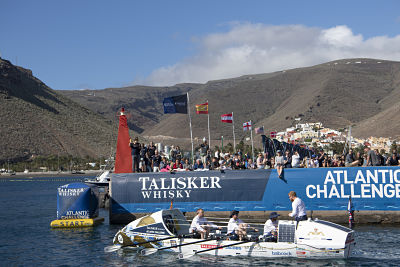
We suffered one capsize about 500 miles from Antigua whilst surfing down a 40-foot wave where we recorded our fastest speed (17 knots) before the boat lost control, turned side on to the wave and capsized.
Fortunately, our boat was designed to self-right and quickly popped back up safely with no injuries to the crew except for a few bruises and a chipped tooth… frustratingly that capsize broke our electronic water maker and caused a few of our shoes to disappear into the Atlantic, which meant we finished the crossing barefooted.
I know you and the HMS Oardacious team put a serious amount of preparation into this challenge but how do you react to situations like that (and losing your shoes) in the middle of the ocean?
The lesson we emphasised throughout the journey was to leave no room for complacency – we stuck to all our safety protocols even if the weather seemed calm (waist harnesses always clipped to the safety life-line, cabin hatches shut at all times).
We learned that no matter how physically strong you are, the ocean is stronger and will ultimately decide where it wants you to end up.
What was the biggest takeaway from this challenge for you?
There are many lessons to be learned from spending 37 days rowing an ocean; you’re completely reliant on yourselves and your own ability to keep going, getting on with the routine, no matter how tired or sore you are, regardless of whether you’re covered in salt sores or blisters.
The challenge very quickly becomes a battle within your mind, and that’s where mindset and mental fortitude make all the difference.
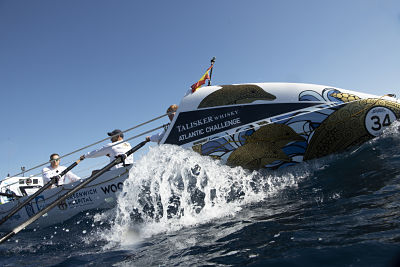
Whenever things were difficult, we were able to keep pushing ourselves and learned just how amazing our bodies really are and that with the right mindset, we can all go on to do incredible things.
This was our first experience of ultra-endurance; it unlocked parts of our potential we didn’t know existed. The challenge saw us push our bodies and minds to extremes we’d never experienced.
Our mindset kept us going, we knew there were only two options and one of those allowed us to finish on the beautiful island of Antigua.
Taking into account that focus on mindset, what would you think about during the course of the race to stay focused?
We kept our minds busy with audiobooks, music and plenty of banter. We even organised a Christmas Day Karaoke (Kara-Row-Ke) that helped us each express our creativity whilst performing for the dolphins...
The key to tackling any expedition of this scale is to build a routine and break it down into manageable milestones, taking each watch and each day as it comes, living in the present whilst keeping an eye on the horizon.
Before we knew it we’d been gone a day, a week, celebrated Christmas, New Year’s, crossed the halfway point; all by focusing our minds on manageable chunks.
Don’t get me wrong, we all experienced our highs and lows but having the team on the boat and our support team on the end of a satellite phone also really helped.
As well as the mental challenges, the Atlantic Rowing Race is obviously a massive physical undertaking. How did you prepare?
No amount of strength and conditioning will make an ocean crossing easy.
We prepared well by bulking up, building power in our legs, glutes and backs; but the biggest physical challenge was the first week on the ocean.
Getting into the two-hour on and two-hour off routine of resting and eating took a while to get used to. It took about a week to settle into our routine and get our “sea legs”.
When we spoke before the event, you mentioned that some of your team were aiming to consume up to 9,000 calories to sustain their body weight. How did your nutrition strategy pan out?
During our preparation we undertook submaximal testing at the Institute of Naval Medicine; it was estimated that we would be burning around 9,000 calories every day, so to avoid losing weight we had to try and replace these continuously, which definitely sounds more fun than it actually is.
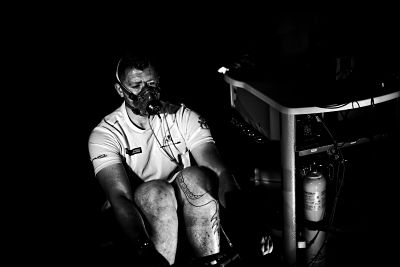
The first week was a real struggle to manage our calorie intake; with bouts of sea sickness that wore off after a few days, we often had to force feed but eventually we settled into comfortably consuming around 7,000 calories of de-hydrated meals, biltong, nuts, and meal replacement shakes.
We purposely gained weight before the crossing knowing we would always be in a calorie deficit. We lost around 18kg each over the course of our 37 days of rowing, so bulking up beforehand was really important.
And you had a Sweat Test before you took on the challenge - how useful was that for you? And what did your hydration strategy consist of during the challenge?
Really helpful! I met the Precision Fuel & Hydration team at the London Marathon Expo in 2019 where I learned so much about the impact of sodium levels on training and performance.
My team and I undertook the Advanced Sweat Test and were able to build our tailored hydration plans unique to each of us.
We consumed between 6-8 litres of water each day, which varied depending on the weather and conditions as the heat levels increased the further south we travelled.
Our hydration strategy was crucial as we needed to perform consistently and repetitively every two hours for over a month. The key was understanding what our bodies were doing and making sure our sodium levels were where they needed to be depending on the time of day.
On an average day, I would generally use PH 1000 every two-hour rowing shift; I would then aim to eat a meal or a snack at the start of each two-hour rest and drink another 500ml water with a PH 500 added.
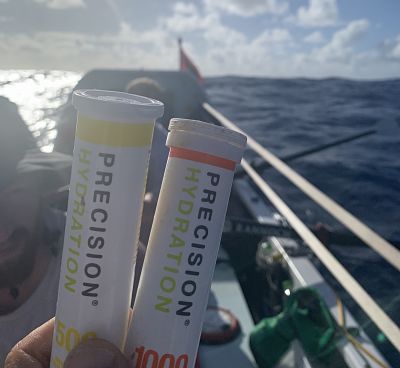
What were the highlights of the challenge for you?
For every low point, there are hundreds of amazing moments - enjoying the peacefulness of the ocean, the adrenaline rush of surfing a boat down waves, the incredible wildlife, night skies and of course all the smiles and laughs with our crewmates.
One of the more sobering parts of the journey was the amount of plastic waste we saw floating around, even in the middle of the Atlantic. Thousands of miles from land, there's still a human impact on nature and it’s important to remind ourselves that we can do more to protect the wonderful ecosystems and creatures we share the ocean with.
We were visited by dolphins, humpback and pilot whales, sea turtles and various sea birds, we saw yellow fin tuna, marlin and thousands of flying fish (being hit by a flying fish in the dark is always a fun surprise when you least expect it).
It was humbling to be graced with the presence of these wonderful creatures and briefly share the water with them.
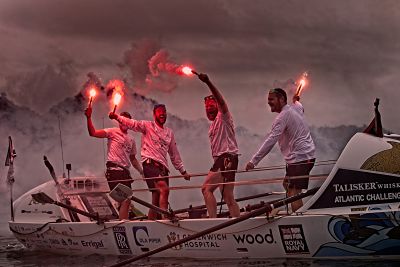
Amazing. And how did you guys celebrate when you reached terra firma in Antigua?
Our first priority on dry land (after the hugs with loved ones), was to shovel a big dirty burger and fries into our faces in front of a crowd of quizzical onlooking tourists.
Having survived entirely on de-hydrated meals and snacks for 37 days, I can honestly say it was the best meal I’ve ever had.
And finally, what advice would you give to ‘Future You’ when you attempt the Atlantic Challenge again in 2022?
To my future self: “Remember that everything seems like a bigger deal when you’re tired and hungry, so take a step back, relax, show some empathy, and remember you’re rowing an ocean - you’re just so lucky to be there!”.